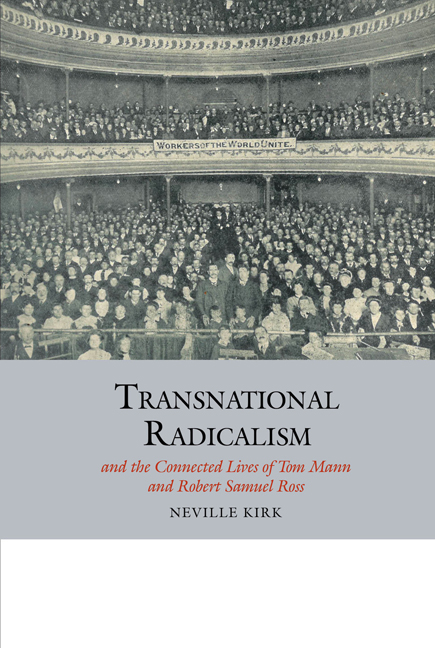4 - Unfolding Differences, Enduring Similarities
from II - Socialism
Summary
The Social Revolution: Industrial and Political Means of Attainment
Mann and Ross attached particular importance to the industrial, political and cultural means of achieving the Social Revolution. In the opening section of Chapter 4, I concentrate on the first two means. The contribution made by culture will be considered as part of my discussion of ‘ethical socialism’ later in the chapter.
As the organised expression of the working class, the united labour movement was afforded a crucial role by both Mann and Ross. It was the ‘hope of the world’, the ‘destined Saviour and Emancipator of all those who are permitted to live merely by the whim and will of Employerdom’. It was the key means whereby the greed and competition of capitalism would be replaced by the ‘universal moral brotherhood’ of altruism and cooperation. Workers were accordingly exhorted by Mann and Ross to join the ranks of organised labour, to ‘perfect their means of industrial organisation’ and ‘advance’ to socialism.
We have seen that between 1902–3 and 1905–6 they had followed their own advice mainly by working within and seeking to move to the left the mainstream unions and labour parties. From mid-1907 onwards a more independent socialist-syndicalist line was followed through their membership of the SFA. Yet in both periods Mann and Ross placed the highest priority upon unity, solidarity, the toleration of diverse views and maintaining contact and influence among the many involved in ‘The Great Class War’ who had ‘no clear intellectual grasp of the science of industrial and social economics’. Not to appreciate this fact and to set up the socialist unfolding differences, enduring Similarities stall outside or in unconditional conflict with the institutions of the labour movement, ‘would mean that we should soon become doctrinaire, exclusive, pedantic, and narrow, and therefore should soon become comparatively useless and perhaps even mischievous’, declared Mann.
- Type
- Chapter
- Information
- Publisher: Liverpool University PressPrint publication year: 2017

